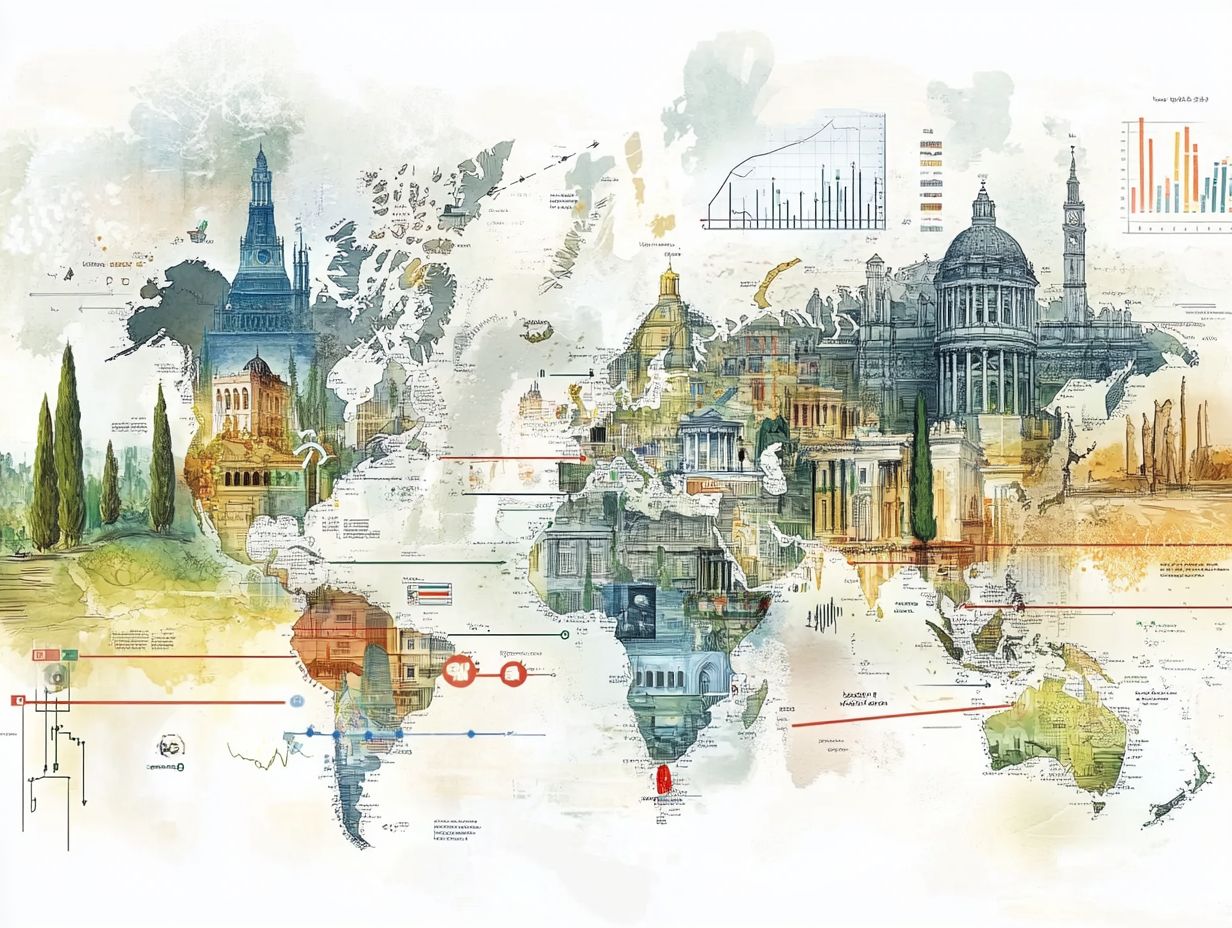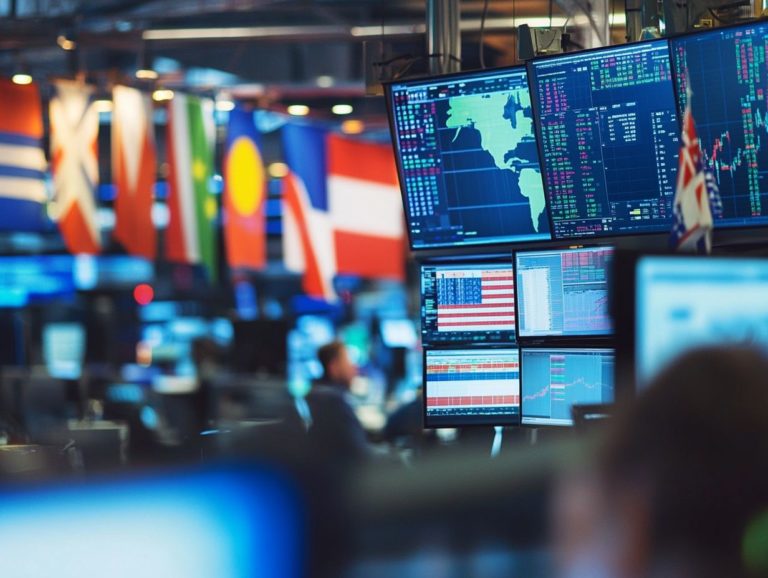How Geopolitical Events Shape Market Trends
In a world where borders and economies intertwine, your understanding of geopolitical events becomes essential, whether you’re an investor or simply observing market movements.
These events ranging from international conflicts to diplomatic breakthroughs can sway market trends significantly. They affect everything from stocks to commodities.
Get ready to explore how geopolitical events shape your world! This article examines the definition of geopolitical events and their implications. It showcases key case studies while exploring how these occurrences shape various markets. Strategies for navigating the resulting volatility are also presented, offering tools to help you predict future trends.
Prepare yourself for an insightful journey into the dynamics of geopolitics and its profound impact on global markets.
Contents
- Key Takeaways:
- Understanding Geopolitical Events
- Major Geopolitical Events that Shape Market Trends
- How Geopolitical Events Affect Different Markets
- Strategies for Navigating Market Volatility
- Predicting Market Trends Through Geopolitical Analysis
- Frequently Asked Questions
- What are geopolitical events and how do they change market trends?
- How do trade agreements between countries affect market trends?
- How does political instability in a country impact its stock market?
- What role do natural disasters play in shaping market trends?
- How do geopolitical tensions between countries impact the stock market?
- Can companies use geopolitical events to their advantage in the stock market?
Key Takeaways:

- Geopolitical events have a significant impact on the market, causing fluctuations and volatility.
- Major events such as elections, wars, and trade policies can shape market trends and affect various sectors.
- Strategies like managing risk in investments and diversification can help mitigate risks and navigate market volatility caused by geopolitical events.
Understanding Geopolitical Events
Geopolitical events include a vast array of important events that can profoundly reshape the economic landscape. They often result in notable shifts in market trends, investor expectations, and government policies. These events influence economic activity across nations, impacting everything from currency strength to market volatility.
For instance, the Russia-Ukraine conflict or changes in trade policy can send ripples through the financial marketplace, affecting international transactions and supply chains. Understanding these events is crucial for you as an investor, enabling you to navigate the complexities of the global economy.
Definition and Impact on Markets
Geopolitical events are important occurrences that can greatly affect international relations and national security. They influence market volatility and financial risks.
These events include wars, trade disputes, and diplomatic conflicts, each capable of creating a ripple effect throughout global financial systems. When uncertainty arises from such developments, your investor sentiment is likely to lean toward risk aversion, leading to price fluctuations in essential commodities and currencies.
The tensions born from these geopolitical scenarios can have serious repercussions for economic growth, potentially disrupting supply chains and fueling inflationary pressures. As market participants react to the shifting landscape, speculation tends to escalate, further intensifying volatility and impacting inflation rates.
This dynamic reshapes financial strategies across the board, making it essential for you to stay informed and adaptable in an ever-changing environment.
Major Geopolitical Events that Shape Market Trends
Major geopolitical events, such as the Russia-Ukraine conflict and the Israel-Hamas war, significantly shape global market trends. These occurrences influence a wide range of factors, from commodity prices to investor sentiment, affecting your investment strategies and financial decisions.
Examples and Case Studies

Case studies of geopolitical events, like the Russia-Ukraine conflict, vividly demonstrate how market dynamics can shift in an instant, influencing trend directions and financial markets.
These events often spark unpredictable price fluctuations, presenting both opportunities and challenges for you as an investor. For example, in the early days of the conflict, oil prices skyrocketed due to rising concerns about supply disruptions. This volatility highlighted how geopolitical tensions can trigger trend reversals, with markets reacting to both immediate realities and anticipated consequences.
When hostilities cease, there’s usually a wave of stabilization that prompts a recalibration of market expectations. By closely observing these shifts, you can gain a deeper understanding of the intricate relationship between international relations and investor sentiment, revealing nuanced insights into market behavior during times of crisis.
Stay informed about geopolitical events and market trends to make the most of your investment strategies!
How Geopolitical Events Affect Different Markets
Geopolitical events exert diverse influences across various markets, such as the stock market, currency valuation, and commodity markets. Understanding how global events influence investment strategies can help navigate these impacts, which are frequently shaped by the intricate dynamics of supply and demand.
Stock Market, Currency, and Commodity Markets
Each market responds differently to geopolitical events. When political instability occurs, stock traders often react quickly, selling off shares due to increased risk. Currency markets may fluctuate based on shifts in government policy and central bank actions. Meanwhile, commodity prices can soar or plummet due to perceived supply disruptions tied to conflicts, highlighting their sensitivity to geopolitical uncertainties.
These variations require you to recalibrate your strategies. Consider incorporating hedging tactics (protecting investments from loss) or taking speculative positions to adeptly navigate the shifting landscape of financial risk and uncertainty.
During market volatility fueled by geopolitical events, employing strategies like hedging and diversification is crucial. These approaches effectively manage financial risks and stabilize your investment flows.
Hedging and Diversification

Hedging and diversification are essential strategies to shield your investments from price fluctuations driven by geopolitical events.
These tactics serve as vital tools, especially when unexpected political shifts or international conflicts create turbulence in global markets. For instance, if you’re holding stocks in a company that heavily relies on foreign supply chains, consider investing in commodities like gold to hedge against potential disruptions.
Diversifying your portfolio across various geographic regions can significantly mitigate risks. If one country faces economic sanctions or unrest, having investments in other stable economies can help cushion your potential losses.
By strategically allocating resources across different asset classes, you not only protect your investments but also bolster your overall economic resilience and optimize investment flows.
Predicting Market Trends Through Geopolitical Analysis
Predicting market trends through geopolitical analysis involves leveraging trend indicators and technical analysis. This enables you to assess potential outcomes in the financial marketplace shaped by global events.
Tools and Techniques for Forecasting
Utilize a variety of tools and techniques to forecast market trends through geopolitical analysis. Methods like technical analysis and moving averages offer valuable insights into economic activity.
These methodologies help you grasp historical patterns and anticipate future shifts driven by geopolitical events. For example, sentiment analysis of social media provides real-time insights into public perception, which can directly impact financial markets.
Employing econometric models enables you to quantify the relationships between various economic indicators and geopolitical factors, leading to a more nuanced understanding of market dynamics. Additionally, scenario planning allows you to visualize potential outcomes under different geopolitical circumstances, enhancing the robustness of your forecasts and aiding you in making informed financial decisions.
Frequently Asked Questions
What are geopolitical events and how do they change market trends?

Geopolitical events shape our world and can dramatically change market trends! Understanding the influence of global events on stock trends includes political, economic, and social factors that influence how countries interact.
These events can affect global trade, supply and demand, and even how investors feel about the market.
How do trade agreements between countries affect market trends?
Trade agreements can open up new markets, cut tariffs, and lower trade barriers, increasing competition.
These deals can also change the prices of goods and services and drive economic growth in the involved countries.
How does political instability in a country impact its stock market?
Political instability creates uncertainty and volatility in a country s stock market.
Investors may become cautious and sell off investments, leading to falling stock prices. Political unrest can also disrupt company operations, further impacting stock prices.
What role do natural disasters play in shaping market trends?
Natural disasters like hurricanes, earthquakes, and droughts significantly affect market trends.
These events can disrupt supply chains, hinder production and distribution, and decrease economic activity, which in turn can impact stock markets and investments.
How do geopolitical tensions between countries impact the stock market?
Geopolitical tensions, such as trade wars or political conflicts, create uncertainty and lead to market volatility.
Investors may become risk-averse and withdraw their investments, causing fluctuations in the market. These tensions also affect global markets due to interconnected economies.
Can companies use geopolitical events to their advantage in the stock market?
Yes, companies can leverage geopolitical events in the stock market.
For instance, companies that adapt their strategies in response to trade agreements or political changes may see their stock prices rise. Companies with a diversified global presence may be better positioned to withstand market fluctuations caused by geopolitical events.





